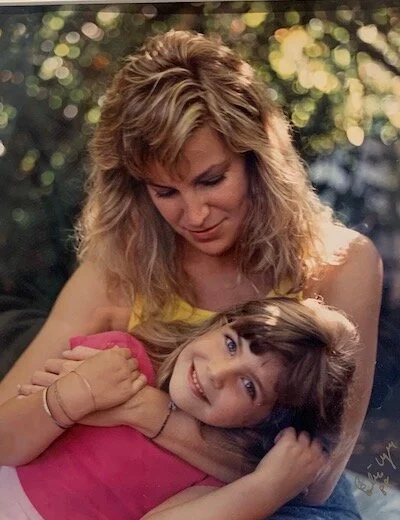My mother’s favorite meal was mashed bananas and cottage cheese. She sat in our spotless black and white kitchen and ate her baby food off of octagonal black plates which were actually dark purple glass when you held them up to the light. Her delight in this mush grossed me out, but I didn’t mind her second favorite meal: scrambled eggs with American cheese. We mostly ate out or had Lean Cuisines in front of the “boob tube”. The small TV room had nothing in it but a Stairmaster lurking in the corner and a floppy little couch. I guess that was her way of not having a guest room.
All of the bedrooms strung along a narrow hallway, mine right across from hers where I would be woken up by grunts and shrieks in the night. Eventually I asked her about it but still struggled to understand what was going on in there, “feeling good” and making those sounds didn’t seem to go together. In the mornings she walked around in her black kimono, hair dripping wet and feet bare. Some of the things, she said, they had thought her crazy for when she lived in Paris with my father. One day, she told me, very pregnant and very hungry, she grabbed an apple on her way out of their apartment. Their gray-haired neighbor in a tidy skirt and short heels had exclaimed upon seeing her, “Look at you, eating an apple like Eve!” Some cultural differences, Mom said, she could never get used to. Eating fruit with a fork and a knife was one of them.
My mother was the most beautiful woman I had ever known. Men would offer to pump her gas for the chance of a few words. People would stare, her radiant, wide smile lighting up their eyes. The whole magic of her being was always there, right next to me: in her small Beamer driving up and down the Berkeley hills, at dinner as I exclaimed over my first tastes of shaved parmigiano reggiano, in line waiting for hugs from Amma at a local ashram. With a mother like her, it was easy to shrink into the background. Add to that her lack of attention to what I put in my mouth (Costco bagel dogs, anything with melted cheddar on top), which eventually turned me into a chubby kid and left me feeling even more like the ugly duckling. It’s painful to read through old diaries, an eleven-year old’s bubbly script deriding my body for pages. I wrote that I could probably be happy if I were just thinner.
Suzanne Segal jumped on the SUV train as soon as the first Ford Explorer Eddie Bauer edition came out in 1991. Her tiny BMW’s of the 80s were gone and replaced by the gas happy big boys that signaled cheap oil and a new kind of extravagance. By now we had a rescue dog she named Shiva, who would ride along happily in the back as we went to the Burger King drive-through, knowing what was coming. We bought our meal along with an extra plain hamburger. My mom handed it over to me to unwrap and toss like a meaty frisbee into the back where Shiva nabbed it out of the air and disappeared it in seconds. We hooted and hollered, sometimes laughing so hard tears ran down our faces. It never got old, though now I wonder about the health implications of fast food for that dog who did not live to a ripe old age.
In 1996, one year before she died at the age of 43, my mother’s book was published. Collision with the Infinite allowed me a glimpse at her “other side”, the part that was not just my mother, the part that was maybe an individual person separate from me. What I learned in the book was that when she was pregnant with me, 28 years old and living in Paris, she had a shocking spiritual experience one day while waiting at a bus stop to go to a doctor’s appointment. At the moment the bus arrived she suddenly and inexplicably lost her sense of personal self, gone and never to return again. What I read I found hard to reconcile with my own childhood, those years she described of profound fear and searching for an explanation for her experiences coinciding with my preschool ballet performances, sunny weekend mornings doing laundry and eating eggs, arguing incessantly in French over the phone with my father, or listening to the summer rain pelt a metal roof in Santa Fe. We had a rich life together, so an account of how “she” was not really there was a disturbing concept to grapple with.
In the dedication to her book she wrote, “For Arielle, who was born into the vastness.” That one line has been a comfort over and again in the 22 years since her death. I like to think it meant that it meant I shared her world with her. Because she certainly was my world.

